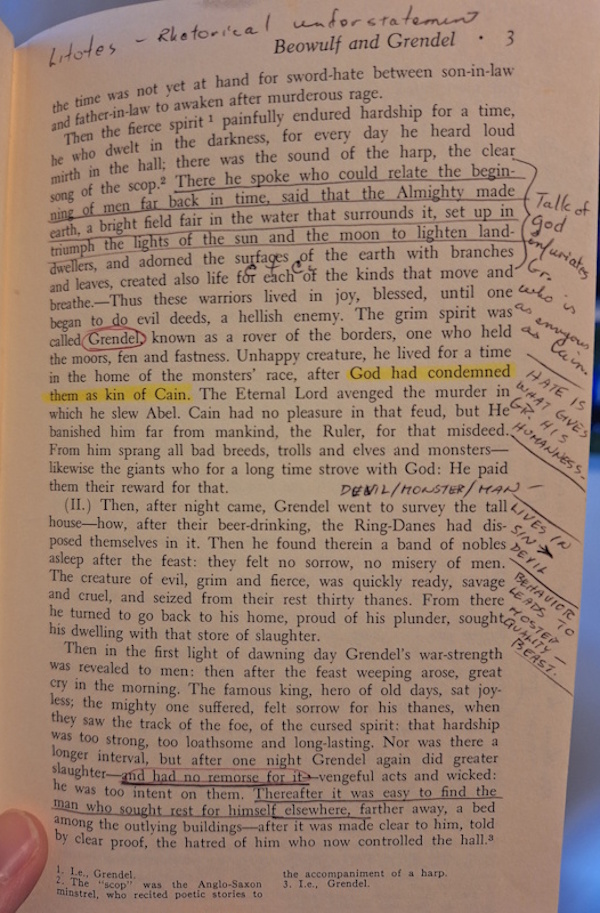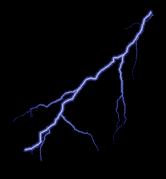Beowulf: A New Prose Translation
 |
 |
 |
 |
 |

- Publication Date: 1966
- Written by: E. Talbot Donaldson [Translator]
- Page count: 58
I've been interested in reading more ancient poetry for quite a while. It's one thing to read a story that has endured for decades or even a couple hundred years, but reading one that has survived 1,000 years or more gives us an insight into human creativity from a millennia that is completely alien to the one in which we live. I remember hearing about Beowulf in a few different literature / history classes when I was in school, but I didn't get around to actually reading it until I was an adult. As one of the oldest works in English literature, it serves as a prototype version of a typical hero story that would be told and retold in many cultures in the following centuries.
Beowulf has a very simple plot, and I like to think of it as one of the foundational "powerful man" stories. The titular hero is a mighty warrior who travels to a distant kingdom that has been repeatedly attacked by the monster Grendel for twelve years. After defeating Grendel with his bare hands and finishing off Grendel's mother for good measure, he returns home to the glory of his kinsmen. After eventually becoming King, he rules for fifty years before he fights his final battle against a fire-breathing dragon, where he finally dies from his wounds. As a protagonist, Beowulf is entirely one-dimensional, and is only meant to be the perfect hero for the audience to look up to. He has no obvious flaws, and almost every character in the story reveres him for his physical strength and his past feats in battle. A lot of his dialogue is made up of boasts about his various accomplishments and how strong he is, or swearing loyalty to his lord and glory to his fellow warriors. He's more of an archetype than an actual character, but that's to be expected in a story this old. The emotions that are elicited in the reader / audience by the words of the poem make up for what he lacks in actual character development. From the grandiose ways in which his battles are described, you can't help but root for him, especially when he does things like fight off sea monsters while swimming in full armor:
"The anger of the sea-fishes was roused. Then my body-mail, hard and hand-linked, gave me help against my foes; the woven war-garment, gold-adorned, covered my breast. A fierce cruel attacker dragged me to the bottom, held me grim in his grasp, but it was granted me to reach the monster with my sword-point, my battle-blade. The war-stroke destroyed the mighty sea-beast - through my hand. Thus often loathsome assailants pressed me hard. I served them with my good sword, as the right was. They had no joy at all of the feast, the malice-workers, that they should eat me, sit around a banquet near the sea-bottom. But in the morning, sword-wounded they lay on the shore, left behind by the waves, put to sleep by the blade, so that thereafter they would never hinder the passage of sea-voyages over the deep water."
My copy of Beowulf comes with an introduction that lays out some of the cultural context surrounding it. It was written at a time when Christianity was spreading throughout Europe, but the original Pagan cultures of the region hadn't been entirely erased yet. This cultural mix is pretty fascinating, and is probably my favorite aspect of the whole work. The main characters are clearly a part of a Pagan warrior culture that places great value on physical might and overcoming enemies in battle. Men strive for honor and glory for themselves and their fellow warriors, and a lot of emphasis is placed on the loyalty that they swear to their lord / King. There is a deep sense of trust between them and their King, and strong bonds are formed by victories in battle and the sharing of treasures among each other. Underlying this very "manly" tale of violence and glory is a Christian theme of good vs. evil. The race of monsters that Grendel belongs to is outright stated to be "a kin of Cain", and Beowulf himself suggests that God will help him persevere in his battle with Grendel by saying "If he dare seek war with out weapon - and then may wise God, Holy Lord, assign glory on whichever hand seems good to Him." God is mentioned numerous other times throughout the text, and a bard even sings a song that is an obvious allusion to the Christian creation myth. There is a whole area of study dedicated to the blending of cultures in this story, and it's pretty interesting to read a Christian poet apply his sense of morality to a fading culture that was "heathen" to his way of life.

I do have to note that I don't think the version of Beowulf that I read is the best translation that is out there. Because of how differently Old English was structured compared to modern English, every translation sacrifices different aspects of wording, rhythm and imagery, and no two will be exactly alike. My copy is known as the Donaldson translation, and from what I've read online, it isn't considered one of the best. It's presented in prose, and while some of the wording can be pretty evocative (especially when it comes to the action sequences), many of the expository bits are very dry and a little difficult to get through. A lot of sentences will repeat certain phrases two or three times, just worded a little differently. If I had to guess, this was probably a way to create a rhythm when the poem was spoken aloud, and this rhythm helped to drive up the emotions and excitement of the audience. But when it's read in this form, that sense of rhythm is absent, and I found myself re-reading certain paragraphs a few times just to get the gist of what was being said. However, I had a helping hand from a surprising source! I got my copy from my local used bookstore, and it was obviously someone's study book from years ago. The margins of many pages are filled with handwritten notes and explanations for different words and phrases that are highlighted, and I relied on these notes quite a bit as I was reading. Reading an ancient poem with helpful annotations from a previous reader is like getting a double-dosage of the past, and for a guy with my taste, that's never a bad thing.
Beowulf is a great story, but I would recommend people to look for a different translation than this one. The prose structuring, run-on sentences and repetitive phrasing turns what should be a quick and exciting read into a bogged-down and sluggish one. Newer translations do a much better job of presenting this story with the language and rhythm that helps it flow like the epic it was meant to be. The Donaldson translation may be imperfect, but I have to thank it for being my introduction to one of the classic hero tales of old.



